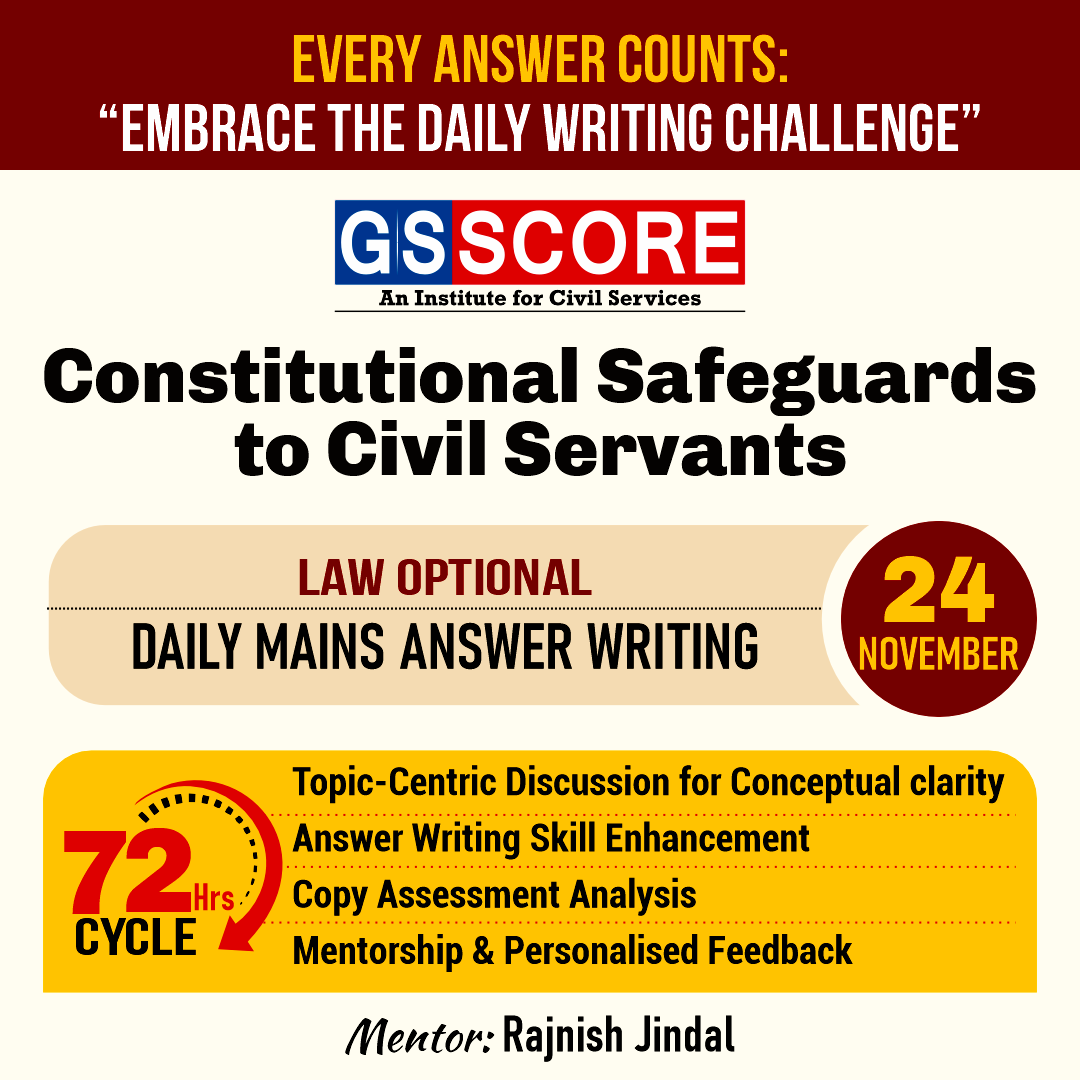


Instruction:
- There will be 2 questions carrying the First Question is-10 marks Write your answers in 150 words and the Second Question is-15 marks Write your answers in 250 words.
- Any page left blank in the answer-book must be crossed out clearly.
- Evaluated Copy will be re-uploaded on the same thread after 2 days of uploading the copy.
- Discussion of the question and one to one answer improvement session of evaluated copies will be conducted through Google Meet with concerned faculty. You will be informed via mail or SMS for the discussion.
Question #1. Critically examine the scope of Doctrine of Pleasure in India with the help of decided judicial pronouncements. 10 marks (150 words)
Question #2. Principle of Natural Justice should be applicable to the Civil Servants as well to decided their dismissal or removal. Analyze. Also, mention the exceptions when this principle can be avoided. 15 marks (250 words)
(Examiner will pay special attention to the candidate's grasp of his/her material, its relevance to the subject chosen, and to his/ her ability to think constructively and to present his/her ideas concisely, logically and effectively).
STEPS & INSTRUCTIONS for uploading the answers
Step 1 - The Question for the day is provided below these instructions. It will be available at 7:00 AM.
Step 2 - Uploading of Answers : Write the answer in A4 Sheet leaving proper margins for comments and feedback and upload the PDF in MY ACCOUNT section. Click on the option of SUBMIT COPY to upload the PDF.
Step 3 - Deadline for Uploading Answers: The students shall upload their answers by 7:00 PM in the evening same day. The first 50 copies will be evaluated.
Step 4 - Feedback : Mentors will give their feedback for the answers uploaded. For more personalised feedback, join our telegram channel by clicking on the link https://t.me/mains_answer_writing_cse . A one-to-one session will be conducted with the faculty after copy evaluation in 72 Hrs.
Model Answer
Question #1. Critically examine the scope of Doctrine of Pleasure in India with the help of decided judicial pronouncements. 10 marks (150 words)
Ans.
The doctrine of pleasure has its origins in English law. In England, the moral rule is that a civil servant of the Crown holds office during the pleasure of the Crown. This means his services can be terminated at any time by the Crown, without assigning any reason. Even if there is a contract of employment involving the Crown, the Crown is not bound by it. In other words, if a civil servant is dismissed from service he cannot claim arrears of salary or damages for premature termination. The doctrine of pleasure is based on public policy.
In India, under Article 310 even civil servants hold office at the pleasure of the President or the Governor as the case may be. That pleasure is absolute.
There are some notable exceptions in Article 310, which has adopted the English Common Law rule that public servants hold office during the pleasure of the President or the Governor. Article 311 imposes two qualifications on the exercise of such pleasure. Though the two qualifications are set out in a separate Article, they clearly restrict the operation of the rule embodied in Article 310(1). In other words, the provisions of Article 311 operate as a proviso to Article 310(1). All existing laws have been continued by Article 372, some of which, for example the Code of Civil Procedure, makes it possible for a public servant to enforce his claims against the state.
Accordingly, the Supreme Court held in State of Bihar v. Abdul Majid (1954), that the English Common Law has not been adopted in its entirely and with all its rigorous implications.
In Union of India v. Tulsiram Patel, (1965), the Supreme Court held that the “pleasure doctrine” was neither a relic of the feudal age nor was it based on any special prerogative of the British Crown but was based upon public policy. Ministers frame policies and the Legislature enacts laws and lays down the mode in which such policies are to be carried out and the object the legislation seeks to achieve. From the nature things, the task of efficiently and effectively implementing these policies and enactments, however, rests with the civil services. The members of the public are therefore vitally interested in the efficiency and integrity of such services.
While the doctrine of pleasure has been adopted from the British legal system, it has been modified to suit Indian context as per prevailing social structure in India. The judiciary has played a key role in balancing the arbitrary aspects of this doctrine by their power of judicial review.
While England has a Monarch as the Executive head, India elects its Executive head through elections. So, the principle ‘the King can do no wrong’ is not suitable to the Indian scenario. Despite the judicial intervention, the exceptions to the protection can still be misused. Therefore instead of reviewing each and every instance of arbitrariness, it would be better if certain guidelines are provided which have to be followed while availing these exceptions. If these guidelines are not followed the dismissal can be held invalid which will also provide speedy redressal to the aggrieved party.
Question #2. Principle of Natural Justice should be applicable to the Civil Servants as well to decided their dismissal or removal. Analyze. Also, mention the exceptions when this principle can be avoided. 15 marks (250 words)
Ans. Article 311 puts certain restriction on the absolute power of the President or Governor for dismissal, removal or reduction in rank of an officer. Article 311 protects the civil servant holding civil post by providing safeguards and protects him from arbitrary arrest.
- No Removal by Subordinate Authority: Removal by subordinate authority does not mean that the dismissal or removal must be by the same authority who made the appointment or by his direct superior. It is enough if the removing authority is of the same or co-ordinate rank as the appointing authority. In Maheshv. State of U P.the person appointed by the Divisional Personnel Officer, E.I.R., was dismissed by the Superintendent, Power, E.I.R. The Court held the dismissal valid as both the officers were of the same rank.
- Reasonable Opportunity of Being Heard: In an important judgment in Managing Director, ECILv. B. Karunakar, the Supreme Court has held that when the enquiry officer is not disciplinary authority, the delinquent employee has a right to receive the copy of the enquiry officer’s report so that he could effectively defend himself before the disciplinary authority. A denial of the enquiry officer’s report before the disciplinary authority takes its decision on the charges, is a denial of reasonable opportunity to the employee to prove his innocence and is a breach of the principles of natural justice. It is difficult to say in advance to what extent the said findings would influence the disciplinary authority while drawing its conclusions. The Court affirmed its rulings in Union of Indiav. Mohd. Ramzan, but held that it will apply only prospectively.
In Khem Chand v. Union of India, the Supreme Court held that the ‘reasonable opportunity’ means:
- An opportunity to deny his guilt and establish his innocence, which he can do only if he is told what the charges levelled against him are and the allegations on which such charges as based.
- An opportunity to defend himself by cross examining the witness produced against him and by examining himself in support of his defiance.
- An opportunity to make his representation as to why the proposed punishment should not be inflicted on him.
Exceptions to Clause (2) Of Article 311: The provision to Article 311 (2) provides for certain circumstances in which the procedure envisaged in the substantive part of the clause need not be followed.
- Conviction on a criminal charge.– One of the circumstances excepted by clause (a) of the provision is when a person is dismissed or removed or reduced in rank on the ground of conduct which has laid to his conviction on a criminal charge. The rationale behind this exception is that a formal inquiry is not necessary in a case in which a court of law has already given a verdict. However, if a conviction is set aside or quashed by a higher court on appeal, the Government servant will be deemed not to have been convicted at all. Then the Government servant will be treated as if he had not been convicted at all and as if the order of dismissal was never in existence. If the appointing authority were aware of the conviction before he was appointed, it might well be expected to refuse to appoint such a person but if for some reason the fact of conviction did not become known till after his appointment, the person concerned could be discharged from service on the basis of his conviction under clause (a) of the proviso without following the normal procedure envisaged in Article 311.
- Impracticability –Clause (b) of the proviso provides that where the appropriate disciplinary authority is satisfied, for reasons to be recorded by that authority in writing that it does not consider it reasonably practicable to give to the person an opportunity of showing cause, no such opportunity need be given. The satisfaction under this clause has to be of the disciplinary authority that has the power to dismiss, remove or reduce the Government servant in rank. As a check against an arbitrary use of this exception, it has been provided that the reasons for which the competent authority decides to do away with the prescribed procedures must be recorded in writing setting out why it would not be practicable to give the accused an opportunity. The use of this exception could be made in case, where, for example a person concerned has absconded or where, for other reasons, it is impracticable to communicate with him.
- Reasons of security – Under proviso (c) to Article 311 (2), where the President is satisfied that the retention of a person in public service is prejudicial to the security of the State, his services can be terminated without recourse to the normal procedure prescribed in Article 311 (2).The satisfaction referred to in the proviso is the subjective satisfaction of the President about the expediency of not giving an opportunity to the employee concerned in the interest of the security of the State. That indicates that the power given to the President is unfettered and cannot be made a justifiable issue, as that would amount to substituting the satisfaction of the court in place of the satisfaction of the President.
The Constitution of India through Article 311, thus protects and safeguards the rights of civil servants in Government service against arbitrary dismissal, removal and reduction in rank. Such protection enables the civil servants to discharge their functions boldly, efficiently and effectively. The public interest and security of India is given predominance over the rights of employees. So conviction for criminal offence, impracticability and inexpediency in the interest of the security of the State are recognised as exceptions. The judiciary has given necessary guidelines and clarifications to supplement the law in Article 311.The judicial norms and constitutional provisions are helpful to strengthen the civil service by giving civil servants sufficient security of tenure. But there may arise instances where these protective provisions are used as a shield by civil servants to abuse their official powers without fear of being dismissed. Disciplinary proceedings initiated by Government departments against corrupt officials are time consuming.


